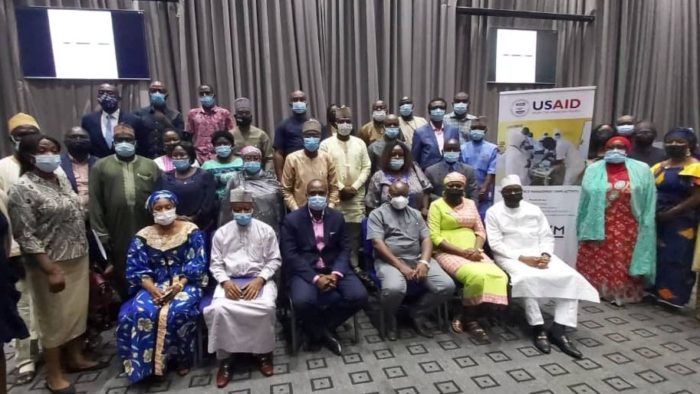Nigeria Health Workforce Management Activity Inaugurates Training Advisory Group in Federal Capital Territory
The USAID/Nigeria Health Workforce Management (HWM) Activity aims to establish a cost‐effective, well-trained, and motivated health workforce, particularly in targeted rural and remote areas to contribute to greater health systems responsiveness and improved health outcomes, especially among women and children in five states across Nigeria — Bauchi, Ebonyi, Kebbi and Sokoto states and the Federal Capital Territory (FCT).

Photo Credit: Aor Ikyaabo, Knowledge Management and Communications Specialist
On August 18, 2021, the United States Agency for International Development (USAID)/Nigeria Health Workforce Management (HWM) Activity, in collaboration with the Health and Human Services Secretariat of the Federal Capital Territory Administration (FCTA), inaugurated the Quality Human Resources for Health (HRH) Training Advisory Group for the FCT.
“The primary objective is to ensure that we develop a well-motivated and skilled workforce that will be deployed to the rural primary health facilities of the FCT,” said Samuel Ngobua, Country Director of HWM. “Most especially, maternal, newborn and child indices. In a layman’s term, to reduce deaths as a result of women’s delivery where there are no health workers.”
Funded by USAID and in collaboration with the Government of Nigeria, HWM responds to Nigeria’s National Strategy Health Development Plan 2018—2022 (NSHDP II) and aligns with the USAID/Nigeria Country Development Cooperation Strategy 2020—2025.
The Training Advisory Groups aim to support state governments in increasing HRH funding by creating a budget line and strengthening multi-sectoral collaboration and engagement between the public and private sector on important HRH issues that impact health workforce management. They will also advocate for improved funding of health training institutions in states and promote the importance of HRH as a key health system strengthening tool.
Representatives from both the public and private sectors, youth groups, civil society organizations and other relevant stakeholders make up the Training Advisory Groups. Together, they will advocate for the government and private sector institutions and individuals to support innovative ways to improve health indices. The Training Advisory Groups will also advise state governments in the sustainable production, deployment, and retention of HRH within the context of state development priorities while facilitating multi-sector collaboration and engagement.
###
The FCT Training Advisory Group inauguration received the following local news coverage:
- “USAID Set To Improve Healthcare Delivery In Rural Communities,” DailyTrust Online, August 18, 2021
- “USAID set to improve healthcare delivery in rural communities,” ASO Chronicles (Print), August 18, 2021
- “FCTA partners USAID to fast track healthcare delivery in rural communities,” BluePrint, August 18, 2021
